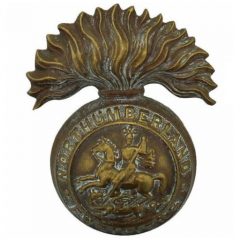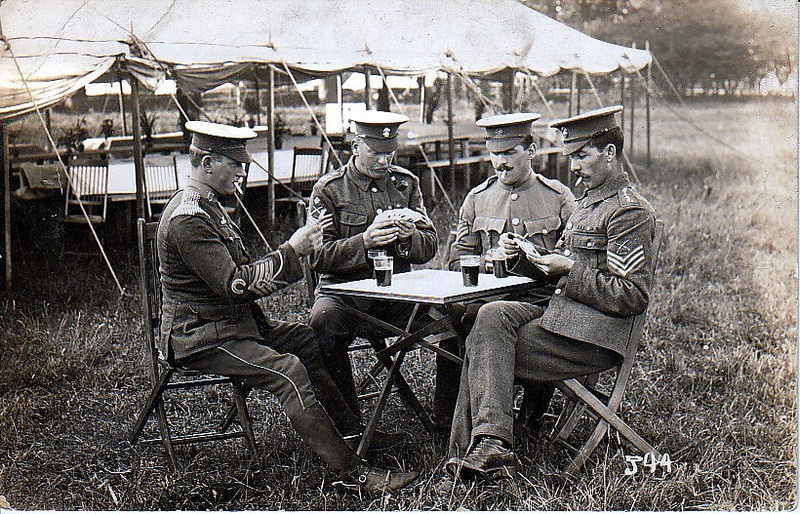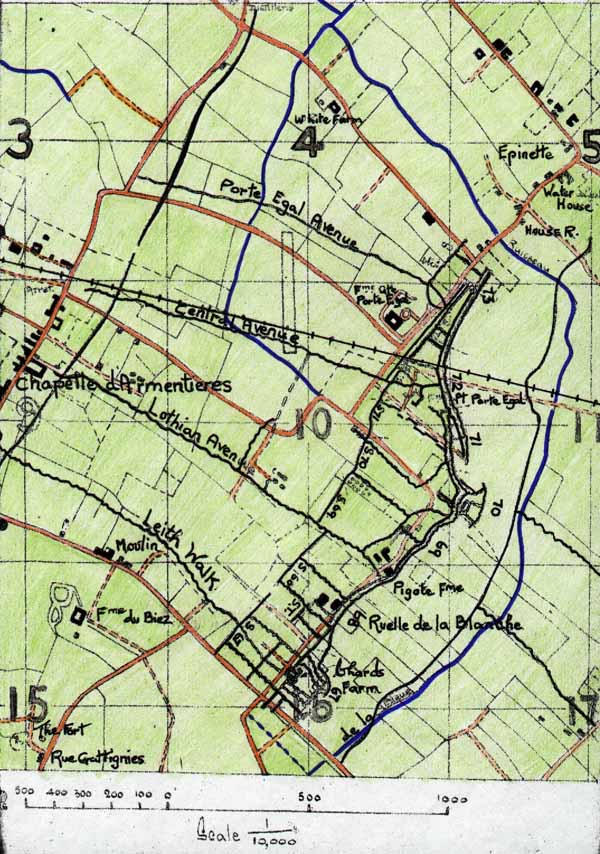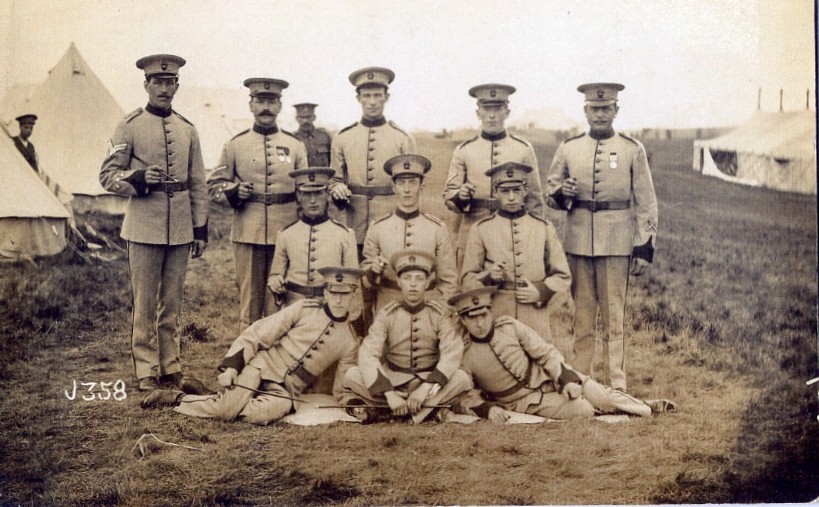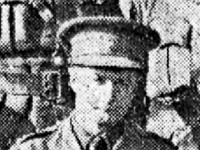General Sir Horace Smith-Dorrien issued Operation Order No8 at 2.15am. The French were to launch an attack with their right flank on the Ypres- Langemarck road.
“At the same time the Lahore Division and troops under General Aldersons’ command, were to recapture much of the ground recently lost. The Lahore Divn was to advance through V Corps positions to attack in the direction of Langemarck, on a thousand-yard front. At the time they were bivouacking near Outerdom, some ten kilometres to the south west of Ypres. They had already marched thirty miles from Bethune to get there and, undisturbed by the clamour of the distant bombardment, most of them were sleeping like logs. By 5.30am they were back on the road, setting off at half-hour intervals to march through Ypres to take up positions north of the St Jean-Wieltje road in preparation for the attack”. (Macdonald: p.251).
‘A’ Coy awoke to find a thick mist covering the ground. As soon as they had eaten, they set off across country to rejoin the rest of the Bn, whose positions near Wieltje were now known. The rest of the Bde was also concentrated around Wieltje, under the orders of the 1st Canadian Divn and ready to act as reserve in the forthcoming attack. Lt Bunbury was in hope that the Bn would be moved further back from the front line, but they soon discovered that they were destined to move forward again. That morning the 4th Bn was placed in good trenches a little to the east of Wieltje and subjected to a heavy artillery bombardment as German spotter planes flew overhead unhindered.
At 10.15am Brigadier General J.F.Riddell (GOC Northumberland Bde) received orders from the GOC 10th Bde to verify a 28th Divn report that stated the enemy was breaking through the front line near Fortuin. At 10.45am the 5th Bn was directed to send forward an officers patrol to verify the report and to move the Bn forward to Fortuin in preparation for a counterattack if the enemy was discovered breaking through. By 12 noon OC 5th Bn was satisfied that the enemy was not attempting to break through at the place indicated. The Bn was subject to heavy shell fire, so they dug in and remained there until dusk, consequently taken no part in the operations of the afternoon.
At 12.15pm General Alderson issued Operation Order No 12, instructing a Bn from the 10th Bde to advance alongside the Lahore Division, between Kitcheners Wood and the Wieltje-St Julien road. At the same time, the Northumberland Bde was to attack St Julien astride the Wieltje-St Julien road. When the artillery barrage commenced at 1.20pm, the Bns detailed for the attack were to advance to the positions from which it would be launched at 2.05pm.
It was not until 1.30pm that Brigadier-General Riddell received these orders, so he had to summon the 4th, 6th and 7th battalion commanders immediately. He stated, that in the opinion of the Commander-in-Chief, it was imperative for the Germans to be kept out of Ypres and that the only way to do this was to fling more men into the breach, make rapid attacks and counter-attacks and to give the enemy the impression that there were large reserves to call upon. Lt Col Foster was instructed to advance an attack with the 4th Bn in a north-easterly direction with their left flank on the Wieltje-St Julien road. The 6th Bn were to advance with their right flank on the road and the 7th Bn were detailed to provide support for the 4th Bn. The fusiliers of the 4th Bn were just finishing their lunch when Colonel Foster returned with the orders, but by 1.50pm they were all on the move. Lt Col Foster called for his four company commanders and issued orders for the battalion to advance in lines of platoons at fifty yard intervals. Two companies, under the command of Major Stephenson, were to be in the first line and two in the rear under the command of the colonel himself.
According to Lt Bunbury no further information or detail was provided, so when the attack began few if anyone in the Bn had any idea where the allied front line trenches were in this part of the line, or what the objective of the attack was. The report submitted by Bde HQ after the action highlights the difficulties:
“The distance from Wieltje to St Julien was approximately 13/4 miles and the ground had not been previously reconnoitred by the staff or any of the officers of the Brigade. No information was received or could be obtained as to the actual position of either our own or the enemy's trenches nor was it known that the GHQ line was strongly wired and that there were only certain places through which the troops would be able to pass.
No communication was ever made with the artillery and no artillery officers got in any way into touch with the Brigadier. The time was short, the order to attack being received at 1.30pm, nevertheless considering that any failure to attack on the part of the Brigade might seriously hamper the operations General Riddell decided to carry out the orders he had received impossible as they seemed”.
The 4th and 6th Bns reached the GHQ line (map ref: C22b & C23c) and were deployed either side of the Wieltje-St Julien road by 2.05pm, immediately coming under heavy shell, machine gun and rifle fire. The thick wire entanglements in front of the GHQ line caused delay and heavy losses, as the men bunched together to squeeze through the gaps. Nevertheless, the wire was negotiated and the advance towards St Julien commenced.
Lt Bunbury wrote:
“We lost no time in getting away, and as soon as we passed through the barbed wire entanglements in front of our trenches, we set off in lines of platoons at about forty yards' interval. Plummer, Turner, and Varvill went with our first line two platoons, and Frank Robinson and myself followed with the other two (Nos 1 and 2).
Practically from the moment we started off we had to face a perfectly hellish shelling, which increased in intensity as we advanced. Shells of every description literally raining on us from our front, right flank and rear, while it seemed to me in the excitement of the advance that our artillery were giving us no support whatever.
The line of our advance lay for about a mile over open ground, and after we had gone a short way, in addition to the inferno of shells in which we were, we became exposed to a very heavy rifle and machine gun fire from the German trenches, which were directly in front of us near a wood at the top of some rising ground, and in such a position that they could fire right over what turned out to be our advanced trench, down on to us. The small arm fire was intense, and the nearest thing I can liken it to is a gigantic swarm of angry bees buzzing all around one. Men were falling on every side, and I felt an intense excitement, but there was no time for thinking, and my one idea was to push on as fast as possible, and to get as many men as possible to follow me, and keep going”.
Under circumstances such as these, Companies and Battalions soon get mixed up, and the last point at which I knew I had the major part of my own men still with me was after I had gone about half way, when we had to cross the St Julien road, and here we lay down for a breather.
“Frank Robinson was the only one of our officers I remember being there, and we appeared to have about a hundred men still with us, though the various lines were already getting mixed, and a good number of them were not belonging to our Company. From here we could see a trench some hundreds of yards in front of us, which with the scanty instructions we had received might have proved to be a German one, but I am thankful to say that I gave orders not to fire, as it turned out to be our own advanced trench occupied by the Seaforths. One could scarcely hear one's own voice for the awful din, and it was only by shouting at the top of of one's voice from mouth to mouth that an order could be conveyed any distance, This was not a very healthy place to stay in, and we did not remain there many minutes, and when FR and I got up to lead forward again the men, who were perfectly splendid throughout, rose and followed us like one man, the order to advance being scarcely needed. From this point on we were in full view of the German position, and men were falling thicker than ever, but we kept plugging along as fast as we could with our heavy packs, etc., and the perspiration was fairly pouring off me, as though I was in bad training, instead of being hard as nails. After we had gone a short way, I fancied that we were being shot at from a farm which was about two hundred yards to our right, and was in the act of swinging some men round to attack this when some RAMC men appeared in the door of the building, and signalling frantically to us not to fire, waved us on in our original direction, which we then resumed. When still about 200 yards behind our advanced trench, we came to a ditch and bank running across our line of advance, and I had a second breather of a few minutes here, and, while peeping over the parapet to choose the line for our further advance, something struck the parapet, sending a quantity of dirt in my face, and simultaneously I felt something hot touch my cheek, and for a moment thought that I had been hit. I turned to a man behind me, and asked him if I was hit, but he told me that it was only a graze, and that there was only a tiny trickle of blood. It was a narrow shave, but left no more mark than a small razor cut would. I then went on again, but by this time I only had a hazy recollection of seeing Frank Robinson somewhere near me still, as we were approaching the trench. Just about this time I had another close shave, as a 'Jack Johnson' burst, as it seemed, just over my head, and the concussion threw me face downwards on to the ground, while when I looked round, previous to rising to go on again, there was a huge hole just behind me, and several of the men following me were lying wounded on either side, while where it had actually fallen there was no trace of a soul and I fear that three or four of the poor fellows were blown into little bits r pounded into the ground. I eventually landed up at our trench, practically I believe at the same time as Frank Robinson, and accompanied by but a few men, several of whom were not even of our Battalion” (Bunbury: p...).
Meanwhile Lt Col Foster had stopped for a breather when several of his men, lying in a shallow ditch behind a hedge, had beckoned him.
“I was very glad to do so for we needed the rest, but the few minutes I could give them seemed to pass in a moment’s flash, and at the word of command; “Now, lads, we have some way to go yet, - we must get on’.” They jumped up on the instant and followed me.
Looking back as I lay upon the ground after one of our rushes, I saw men being blown twenty feet into the air by the bursting shells and, realising that as there was no cover the quicker we advanced the less we should suffer, I sprang up and ran ahead, shouting to the men to come on as fast as possible” (Foster: p.20).
By 2.45pm the remnants of the 4th and 6th Bns had reached the front line trenches (map ref: C17b) and the 7th Bn had joined the attack. Around 3.10pm isolated parties of the 6th Bn pushed forward a further 250 yards to occupy trenches from which the enemy had apparently retired. Elements of the Bn actually succeeded in entering, and for a time occupying the southern portion of St Julien, but they were eventually driven back, mainly due to the effects of gas, and finally occupied a line a short distance to the south.
During the whole of this period the Lahore Divn and the Bn from the 10th Bde were not seen. It was subsequently discovered that their orders had been cancelled and the Northumberland Bde had not been informed.
The 4th Bn fusiliers who were lucky enough to reach the advanced trenches unscathed were surprised to find they were occupied by a few Seaforth Highlanders (2nd Bn, 10th Bde). To Colonel Fosters' distress, he discovered that eight of the highlanders had been wounded by his men during the advance. Hardly surprising because the Colonel had not been informed that there were still British units in his line of attack. A steady trickle of fusiliers were reaching the trench and it was soon full, so some men had to dig into the rear of it.
Crawling along the shallow trench Lt Col Foster was pleased to find Col Jackson and Major Joicey of the 7th Battalion, and Lts Bunbury and Cranage of the 4th had survived. Right at the very end of the trench he found Capt Dixon and Lt Gibson.
At 3.45pm, Brig Gen Riddell left Bde HQ in the support trench (map ref: C23a) and went forward, accompanied by his Bde Major, to confer with his Bn Cdrs. At a point about one hundred and fifty yards south of Vanheule Farm (map ref: C17d) he was shot in the head and died instantly. As the senior officer in the front line, Lt Col Foster (OC 4th Bn) assumed command of the Bde and ordered all three Bns to dig in where they were as best they could. A message was dispatched to Colonel Coles CMS, DSO (OC 5th Bn) informing him of General Riddell's death and that as the senior officer in the Bde, command had now devolved to him. However, the location of Colonel Coles HQ was unknown at the time, so it was not until 7pm that he arrived at Brigade HQ.
At 7.30pm Col Coles, having ascertained that the services of the Bde were no longer required in the first line trench, ordered the troops to retire and to bivouac at Wieltje.
A 4th Bn officer wrote: “After the attack it was a strange sight when darkness fell that night. Although quite close to the German trenches both sides seemed to be tired of fighting for the present, and we were able to get up and walk about with comparative safety and get the Battalions and Companies sorted up ready for everybody else. We had a busy time after that gathering in wounded and burying the dead, and there were many things I saw that night I should be glad to forget. What disgusted me most I think was the way they fired on the wounded crawling back to shelter. There was a farm about half way up used as a dressing station, and this they shelled continuously and any party of stretcher bearers leaving it always came in for a very hot time”. (Hexham Courant: 29 May 15).
Lt Bunbury was ordered to take a party of men and scour the area immediately to the rear of the trench for dead and wounded. Once the wounded had been taken to the dressing station they had passed in the attack, the party set about burying the dead:
"a most gruesome job, as in many cases we could only ascertain to what battalion the poor dead fellows belonged by examining their identity discs, which in most cases are worn suspended round the neck by a cord next the skin, and many of the corpses were in a fearful state and their clothes stiff with blood.
After a long and laborious time we collected five of our own dead, and I then set the working party to dig two graves for them near the dressing station, while I collected their identity discs and pay books, and went through their packs, haversacks, and pockets, and collected and tied together any little personal belongings which I thought their people might like to have”.
“We put two into each grave and after filling them in we put up a little wooden cross to mark where the first men of the 4th Northumberland Fusiliers who fell in action had been buried on the field of battle. The men we buried were Lance Cpl Woodman, of my platoon (who was subsequently mentioned in dispatches for the gallant work yesterday), Privates Herdman, Paxton and Scott” .
The Bde withdrawal began at 7.30pm and all were 'relieved' and on their way back to 2nd line dugouts around Wieltje by 11pm. So ended the first encounter with the enemy.
The first Bn roll call revealed that 19 men had been killed, 188 wounded and 98 were still missing. Capt's Chipper, Hunting and Plummer, Lts Carrick, Speke and 2nd Lt Allen were all wounded ('D' Coy losing three of its six officers). It was impossible to conduct a proper roll call for several days, because the platoons and companies had all become muddled up and many of the men who had become separated during the attack did not report in until several days later.
More than 50 fusiliers from the 4th Bn were actually killed or died of wounds received on that day.
In all, the Northumbrian Bde had lost forty-two officers and 1912 men, two thirds of its strength in one afternoon.
